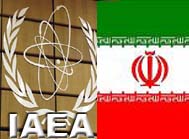Iranian, Syrian nuclear intentions in focus as IAEA board meets
 Vienna - Questions about Iran's past nuclear activities and about Syria's alleged secret nuclear programme are expected to dominate a meeting of the International Atomic Energy Agency's (IAEA) board that opened in Vienna on Monday.
Vienna - Questions about Iran's past nuclear activities and about Syria's alleged secret nuclear programme are expected to dominate a meeting of the International Atomic Energy Agency's (IAEA) board that opened in Vienna on Monday.
The 35-member IAEA Board of Governors is set to discuss Iran's lack of cooperation in explaining a set of past studies, which the international nuclear watchdog says could be related to an effort to develop nuclear weapons.
Iran strongly denies that it ever intended to use nuclear technology for military purposes.
Reports that Iran made nuclear warheads were "totally baseless " and "not in line with our national interests," Hossein Salami, a General of Iran's revolutionary guards, was quoted by Iranian news agency IRNA on Sunday.
IAEA Director General Mohamed ElBaradei wrote in his latest report on Iran that his inspectors had not found evidence of actual weapons manufacturing.
However, several IAEA reports have laid out indications for an Iranian atom bomb effort, including a blueprint for a nuclear warhead obtained by Tehran, and work on the modification of Shahab-3 missiles which points to nuclear use.
As Iran has neither heeded the call of the United Nations Security Council to answer outstanding questions, nor to halt its uranium enrichment programme, Britain, China, France, Russia and the United States, as well as Germany, met Friday in Washington to discuss a possible new Security Council resolution.
While the US, the European Union and others are expected to make strong statements at the IAEA board meeting condemning Iran's position, a resolution in Vienna is unlikely, according to diplomats.
On Monday, ElBaradei is set to give board members an interim report on Syria, which is suspected of having secretly built a nuclear reactor, possibly with North Korean help.
IAEA inspectors took samples at the alleged site in June, which was bombed by Israeli warplanes last year. Diplomats said last week that results were still outstanding and no final assessment would be possible unless Syria gives the IAEA access to further sites. (dpa)